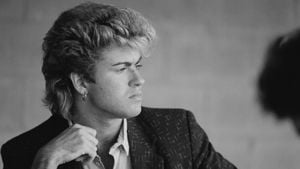Authorities are continuing to investigate the shocking murder of UnitedHealthcare CEO Brian Thompson, allegedly carried out by 26-year-old Luigi Mangione, who was recently arrested. The case has gripped the nation, with troubling questions arising about Mangione's motives and his background.
Mangione was apprehended on December 9, shortly after the murder outside the New York Hilton Midtown hotel on December 4, where he is accused of executing Thompson execution-style. The FBI and local authorities had placed him on their radar following his mother’s report of him missing, filed two weeks prior to the shooting. Law enforcement noted he had vanished from contact with family and friends, which raises concerns about his mental state as the events unfolded.
A police investigator first recognized Mangione from the wanted bulletin announcing his disappearance and reported this to the FBI, as the manhunt extended across state lines. San Francisco officials indicated Mangione was not on their radar until the crime, which raises questions about how he slipped through the cracks. Arrested at a McDonald's in Pennsylvania, he reportedly attempted to evade capture by utilizing several pieces of fraudulent identification.
Following his capture, Mangione was charged with first-degree murder, possessing weapons illegally, and forgery. His attorney, Thomas Dickey, has proclaimed his client’s innocence, expressing skepticism about the available evidence against him. "I haven't seen any evidence they have the right guy," Dickey stated firmly. This statement echoes the frustrations many feel about the situation, as forensic evidence linking Mangione to the scene has raised the stakes considerably.
During the investigation, authorities say they found Mangione’s fingerprints on items located near the crime scene, as well as matching shell casings from the gun he possessed when detained. The chilling details don't end there; investigators discovered a notebook belonging to Mangione which contained elaborate plans and lists for committing the murder. This has led some to speculate about his mental state prior to the shooting, especially as he once praised the infamous Unabomber Ted Kaczynski on social media.
New York’s Police Chief of Detectives, Joseph Kenny, suggested Mangione’s potential motivations were deeply personal, expressing suspicions of ill will toward the insurance industry. Kenny elaborated, mentioning: "We’ve found notes indicating he may have targeted UnitedHealthcare for being the fifth largest corporation and the largest health care organization in America." Strikingly, it was verified he had no affiliation with UnitedHealthcare as either client or employee, which leaves many wondering what drove him to this extreme.
The family's lawyer, David B. Irwin, stated they felt blindsided by the media's coverage of Mangione’s accusations. The Mangione family has expressed their love and support for Luigi, yet lamented they lacked any firsthand information about the case, learning primarily through news outlets. Meanwhile, communications between Mangione and his family had waned drastically, with messages dating back months prior to the incident showing concern among family and friends for his well-being.
Among the messages online, some friends were desperate: "Hey are you okay? Nobody had heard from you for months," one pleaded. This lack of communication coincides with reported behavior changes after experiencing severe back injuries earlier this year, something officers speculate might have influenced his actions leading up to the tragedy.
Despite his background as the valedictorian of his high school and his advanced degrees from the University of Pennsylvania, the details of his life paint a stark picture. Once seen as a model student and athlete, his sudden descent from respectability to infamy leaves many who knew him struggling to reconcile these two sides.
Adding to the mystique and controversy surrounding the case is the strange circumstance of Mangione's rumored disappearance and the apparent undertone of mental health struggles exacerbated by his past health issues, including battles with Lyme disease. Those familiar with him claim his difficulties became pronounced during his college years, hinting at emotional and psychological factors at play.
Overall, Mangione’s story prompts serious questions about the pressures of modern society, corporate America, mental health, and the tragic intersections between personal crises and violence. Moving forward, authorities and the public alike will be watching closely as new revelations about this case continue to surface.
With hearings pending and various charges still looming, it’s clear Mario Luigi Mangione's case challenges all of us to ask not just who he is, but how and why someone with promise might turn to violence.



